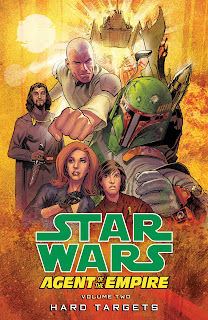I love Darth Vader. Darth Vader is easily my favorite villain of all time and nothing, not even the Prequels, could shake my love of the character. However, it's undeniable that the original Dark Lord of the Sith has suffered some villain decay since the days of A New Hope. Even Timothy Zahn, patron saint of the Star Wars EU, remembered Darth Vader more for his strangling subordinates than his tactical genius.
Let us not forget that Vader is the one who found the Rebel Alliance's base twice and is always one step ahead of the Rebellion. Indeed, if Darth Vader has one flaw, it's that he always has too much faith in his subordinates since the reason we lose two Death Stars is because Vader lets the Rebels go with the plans the first time followed by letting Luke's crew land on Endor versus capturing them outright. Oh well, no villain is perfect.
The last time I felt Darth Vader really had any respect from the Expanded Universe, aside from that one time when he killed a resurrected Darth Maul (before he was resurrected in canon), was the original Marvel comic book series. Marvel, perhaps because of their familiarity with Highness Doctor Victor Von Doom, *GOT* Darth Vader. Their version was a chessmaster and a subtle murderer who was personally running the Rebellion into the ground.

The new Marvel comics series starring Lord Vader is a mixture of the good and bad Vader. This Darth Vader, newly back from the destruction of the first Death Star, isn't quite the Dark Lord at his finest. That's because this novel, shock of shocks, has decided to give Darth Vader an arc. Do you remember A New Hope when Vader released Admiral Motti from his force grip? That was because Grand Moff Tarkin ordered it.
At some point, most likely due to George Lucas changing his mind about where he wanted to go with the story, Darth Vader wasn't 2nd in command of the Empire. He's the Dark Lord of the Sith's apprentice but clearly not terribly respected in the Empire's ranks. If Grand Moff Tarkin is the head of the Joint Chiefs of Staff then Darth Vader is that guy the Emperor sends to check up on things. No real rank and kind of just there. It just so happens he's seven-feet-tall and a cyborg wizard.
This comic is all about Darth Vader deciding, after a series of humiliations at the hands of the Emperor followed by the discovery of Luke Skywalker's existence, that's it's probably time to get serious about murdering his Sith master. I'm not sure that it should take twenty years of being the Emperor's errand boy for Vader to decide he should murder his master. Frankly, I think he should be plotting that after Mustafar but what do I know?
Even so, I like Darth Vader deciding to take his destiny into his hands and he does it in an interesting way. Darth Vader also doesn't suffer humiliations well. One of the best scenes of the book is where Grand General Tagge decides to assign Darth Vader a "minder" to report on his actions as if he was a dog. The next mission, Vader kills him and brings evidence he's a traitor to let Grand General Tagge know he's not a man to be triffled with--even if the latter immediately assigns a second one.
The book also deserves credit for creating some truly interesting new characters as well as reviving old ones. Cassio Tagge, the guy who said, "The Rebellion will continue to gain a support in the Imperial Senate" turns out to be alive and has been promoted to head of the Imperial military. He has a very valid philosophy that the Death Star was probably a stupid idea and a waste of resources but Vader argues big dramatic examples work too. There's also the introduction of "sexy evil Asian female Indiana Jones" a.k.a Doctor Aphra who is just this bizarre character who works perfectly as Vader's new sidekick.
Do I think this book is perfect? No, honestly, I don't. I really can't get behind the idea Darth Vader has been loyally serving Palpatine these past twenty years with no thought of murdering him. I also think the Emperor wouldn't be coming down on Darth Vader so hard without a real reason. Not because Palpatine isn't a petty monstrous jackass but because he has reasons for everything he does. Still, I really am enjoying Vader's growth into becoming the best Dark Lord of the Sith he could be. I only wish it had happened one year after Revenge of the Sith rather than twenty. Still, Doctor Aphra more than makes up for it.
9/10
























